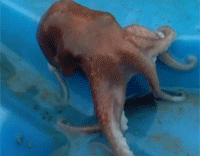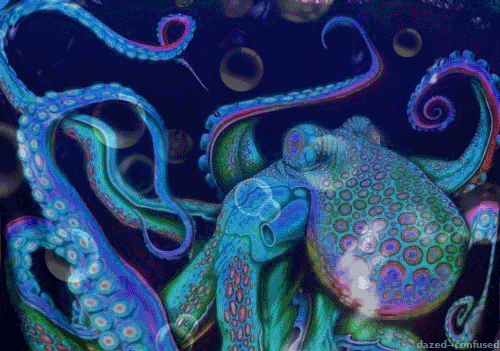Skip to comments.
How the octopus got its smarts
Cosmos Magazine ^
| September 17, 2018
Posted on 09/22/2018 9:37:26 AM PDT by ETL
Did the octopus evolve its unique intelligence by playing fast and free with the genetic code? Elizabeth Finkel investigates
-BIG snip-
How did the octopus get so smart?
Some 400 million years ago, cephalopods – creatures named for the fact that their heads are joined to their feet – ruled the oceans. They feasted on shrimp and starfish, grew to enormous sizes like the six-metre long Nautiloid, Cameroceras, and used their spiral-shaped shells for protection and flotation.
Then the age of fishes dawned, dethroning cephalopods as the top predators. Most of the spiral-shelled species became extinct; modern nautilus was one of the few exceptions.
But one group shed or internalised their shells. Thus unencumbered, they were free to explore new ways to compete with the smarter, fleeter fish. They gave rise to the octopus, squid and cuttlefish – a group known as the coleoids.
Their innovations were dazzling. They split their molluscan foot, creating eight highly dexterous arms, each with hundreds of suckers as agile as opposable thumbs. To illustrate this dexterity, Mather relates the story of a colleague who found his octopus pulling out its stitches after surgery.
But those limber bodies were a tasty treat to fish predators, so the octopus evolved ‘thinking skin’ that could melt into the background in a fifth of a second. These quick-change artists not only use a palette of skin pigments to paint with, they also have a repertoire of smooth to spiky skin textures, as well as body and arm contortions to complete their performance – perhaps an imitation of a patch of algae, as they stealthily perambulate on two of their eight arms.
“It’s not orchestrated by simple reflexes,” says Roger Hanlon, who researches camouflage behaviour at the Marine Biological Laboratory in Woods Hole, Massachusetts. “It’s a context-specific, fast computation of decisions carried out in multiple levels of the brain.” And it depends critically on a pair of camera eyes with keen capabilities.
It takes serious computing power to control eight arms, hundreds of suckers, ‘thinking skin’ and camera eyes. Hence the oversized brain of the octopus. With its 500 million neurons, that’s two and a half times that of a rat. But their brain anatomy is very different.
A mammalian brain is a centralised processor that sends and receives signals via the spinal cord. But for the octopus, only 10% of its brain is centralised in a highly folded, 30-lobed donut-shaped structure arranged around its oesophagus (really). Two optic lobes account for another 30%, and 60% lies in the arms. “It’s a weird way to construct a complex brain,” says Hanlon. “Everything about this animal is goofy and weird.”
Take the arms: they’re considered to have their own ‘mini-brain’ not just because they are so packed with neurons but because they also have independent processing power. For instance, an octopus escaping a predator can detach an arm that will happily continue crawling around for up to 10 minutes.
Indeed, until an experiment by Kuba and colleagues in 2011, some suspected the arms’ movements were independent of their central brain. They aren’t. Rather it appears that the brain gives a high-level command that a staff of eight arms execute autonomously.
“The arm has some fascinating reflexes, but it doesn’t learn,” says Kuba, who studied these reflexes between 2009 and 2013 as part of a European Union project to design bio-inspired robots.
And then there’s their ‘thinking’ skin. Again the brain, primarily the optic lobes, controls the processing power here. The evidence comes from a 1988 study by Hanlon and John Messenger from the University of Sheffield. They showed that blinded newly hatched cuttlefish could no longer match their surroundings.
They were still able to change colour and body patterns but in a seemingly random fashion. Anatomical evidence also shows that nerves in the lower brain connect directly to muscles surrounding the pigment sacs or chromatophores.
Like an artist spreading pigment on a pallet, activating the muscles pulls the sacs apart spreading the chromatophore pigments into thin discs of colour. But the octopus is not composing a picture. Hanlon’s experiments with cuttlefish show they are deploying one of three pre-existing patterns – uniform, mottled or disruptive – to achieve camouflage on diverse backgrounds.
As far as detailed brain circuitry goes, researchers have made little progress since the 1970s when legendary British neuroscientist J.Z Young worked out the gross anatomy of the distributed coleoid brain. Escaping Britain’s dismal winter for the Stazione Zoologica in balmy Naples, Young’s research was part of an American Air Force funded project to search for the theoretical memory circuit, the ‘engram’.
“They were ahead of their time,” says Hanlon, who experienced a stint with Young in Naples. Nevertheless they were limited by the paucity of brain-recording techniques that were suited to the octopus.
It’s a problem that has continued to hold back the understanding of how their brain circuits work. “Is it the same as the way mammals process information? We don’t know,” says Ragsdale.
-BIG snip-
TOPICS: Chit/Chat; Science
KEYWORDS: octopi; octopus
Navigation: use the links below to view more comments.
first 1-20, 21-40, 41-50 next last
1
posted on
09/22/2018 9:37:26 AM PDT
by
ETL
Scientists gave octopuses ecstasy and it revealed a secret genetic link to humans
News.com.au ^ | Sept 21, 2018 | Nick Whigham
Posted on 9/21/2018, 2:13:49 PM by ETL
SCIENTISTS gave the popular party drug MDMA to a group of octopuses and the results were “completely unexpected” and reveal a hidden link to humans
SCIENTISTS have discovered what happens when you give the party drug MDMA to an octopus, and say the animals surprising reaction has “amazing” implications.
A team of researchers in the US decided to give a group of octopuses MDMA, often referred to as ecstasy or Molly to see how it would alter their behaviour.
After being dosed, the sea creatures become much more social, friendly and interested in others.
It made the animals — normally anti-social creatures — want to gather together, hug, and touch each other in a curious fashion.
Remarkably, they exhibited much the same behaviour as humans do when taking the drug that produces feeling of euphoria and a desire for social connection. And that’s the surprising part.
As the researchers pointed out, human and octopus lineages are separated by over 500 million years of evolution and show divergent anatomical patterns of brain organisation. In terms of our nervous system, we could hardly be more different.
The purpose of the study was for scientists at the Marine Biological Laboratory in Massachusetts to work out if octopuses and humans shared any genetic links.
(Excerpt) Read more at news.com.au ...


2
posted on
09/22/2018 9:37:43 AM PDT
by
ETL
(Obama-Hillary, REAL Russia collusion! Uranium-One Deal, Missile Defense, Iran Deal, Nukes: Click ETL)
To: All
The jury is still out on this because the experiment was tried on 4 other creatures, a horse, a goat, a tree sloth, and a former vice president, with very similar results...


:no_upscale()/cdn.vox-cdn.com/uploads/chorus_asset/file/12362569/n617392448_129420_8301_original.0.jpeg)

3
posted on
09/22/2018 9:40:49 AM PDT
by
ETL
(Obama-Hillary, REAL Russia collusion! Uranium-One Deal, Missile Defense, Iran Deal, Nukes: Click ETL)
To: ETL
Sorry, Cosmos, you went into la-la land when you used the phrase “400 million years ago.” God did not create the earth 400 million or more years ago.
Fake Science.
4
posted on
09/22/2018 9:44:00 AM PDT
by
Tudorfly
(All things are possible within the will of God.)
To: Tudorfly
GoreBull Warming is fake science.
5
posted on
09/22/2018 9:44:58 AM PDT
by
ETL
(Obama-Hillary, REAL Russia collusion! Uranium-One Deal, Missile Defense, Iran Deal, Nukes: Click ETL)
To: ETL
Talent without discipline is like an octopus on roller skates. There’s plenty of movement, but you never know if it’s going to be forward, backwards, or sideways.
6
posted on
09/22/2018 9:45:55 AM PDT
by
Brother Cracker
(You are more likely to find krugerrands in a Cracker Jack box than 22 ammo at Wal-Mart)
To: ETL
7
posted on
09/22/2018 9:56:05 AM PDT
by
Tudorfly
(All things are possible within the will of God.)
To: ETL
The amazing part is they get so smart but only live so briefly. The lifespan of the common Atlantic octopus is only a couple of years. The giant Pacific octopus is about four years. But they’ve been shown to demonstrate problem-solving, like figuring out how to unscrew the lid on a glass jar to get at a fish inside. They’ve also been shown to learn by observing.
What blows my mind when I’ve seen them while scuba diving is that they can change not just the color of their skin at will but also its texture. In a fraction of a second they go from smooth-skinned, useful for hiding among the rocks, to spiky-looking, so they can hide in the eel grass.
Without a doubt they’re the most fascinating critter I’ve ever seen in the wild.
To: ETL
[[How did the octopus get so smart?]]
It gradiated from the Dodo School of Higher learning, that’s how
9
posted on
09/22/2018 10:06:47 AM PDT
by
Bob434
To: ETL
Octopus = Al Gore at a massage parlor.
10
posted on
09/22/2018 10:08:23 AM PDT
by
RandallFlagg
(Fact: Gun control laws kill innocents.)
To: Paal Gulli
[[The lifespan of the common Atlantic octopus is only a couple of years.]]
That’s only because they are heavy smokers
11
posted on
09/22/2018 10:08:37 AM PDT
by
Bob434
To: ETL
If you are into Octopus as much as I am you need to read this too.
https://people.com/pets/octopus-mdma-ecstasy-study/
“Brothers from another mothe..... XXXXX
Ok sorry, just really cool and smart.
Survivor aliens dropped in the ocean? Put on your tin hats sit down and let me tell you a story now............
12
posted on
09/22/2018 10:10:09 AM PDT
by
Ndorfin
To: Paal Gulli
[[What blows my mind when I’ve seen them while scuba diving is that they can change not just the color of their skin at will but also its texture.]]
Pffff- that’s nothing, Bradley Manning went from being a man to being a ... well ... a man without man parts
13
posted on
09/22/2018 10:11:08 AM PDT
by
Bob434
To: ETL
I’d like to be under the sea
In an octopus’ garden in the shade
He’d let us in, knows where we’ve been
In his octopus’ garden in the shade
To: Paal Gulli
Imagine how smart they could be if they lived decades?
To: ETL
I noticed yesterday that COSTCO was selling octopus. I’m a little suspect of it, like the sushi at 7/11, not that I’m in the market for either.
16
posted on
09/22/2018 10:22:45 AM PDT
by
rey
To: ETL
To: Bob434
Home schooling, just like the fish!
18
posted on
09/22/2018 10:32:26 AM PDT
by
Waverunner
(I'd like to welcome our new overlords, say hello to my little friend)
To: ETL
Title says HOW the octopus got its smarts...they show NO evidence of “how”...recounting an unobservable lineage is not HOW. Title should have been....”octopii show distributive brain functionality”....they should examine the brains of closest related animals and dna/rna/proteins/epigenetics for a clue as to differences....then maybe the HOW will be clearer.
19
posted on
09/22/2018 10:42:45 AM PDT
by
Getready
(Wisdom is more valuable than gold and diamonds, and harder to find.)
To: Waverunner
20
posted on
09/22/2018 10:42:50 AM PDT
by
Bob434
Navigation: use the links below to view more comments.
first 1-20, 21-40, 41-50 next last
Disclaimer:
Opinions posted on Free Republic are those of the individual
posters and do not necessarily represent the opinion of Free Republic or its
management. All materials posted herein are protected by copyright law and the
exemption for fair use of copyrighted works.
FreeRepublic.com is powered by software copyright 2000-2008 John Robinson






:no_upscale()/cdn.vox-cdn.com/uploads/chorus_asset/file/12362569/n617392448_129420_8301_original.0.jpeg)

